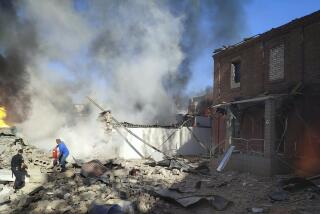Welcome Breeze From the North
- Share via
The crisis that has been rapidly building over North Korea’s suspected nuclear weapons program seems for now to have abated. Inspectors from the International Atomic Energy Agency have been sent to Pyongyang to see what they can learn about the refueling of a key reactor that is now under way. Washington, welcoming this and other recent signs hinting at a more cooperative attitude by the North, says that it’s ready to reopen high-level contacts with Kim Il Sung’s regime.
So for the moment at least the United States doesn’t have to worry about trying to muster international support for economic sanctions against a country that, at a minimum, seems to have done all it can to encourage the belief that it has been violating the Nuclear Non-Proliferation Treaty. How long that moment will last is up to Pyongyang.
The key question is whether North Korea will let IAEA inspectors examine several hundred specifically chosen fuel rods from its five-megawatt reactor at Yongbyon, north of Pyongyang. By analyzing certain rods the IAEA could tell how long they had been in the reactor, and that in turn would indicate whether other fuel rods had earlier been secretly removed. There’s a suspicion, heightened in the last few days by the claims in Tokyo of a North Korean defector who once worked at the Yongbyon reprocessing plant, that 26 pounds of plutonium were secretly extracted from spent fuel rods in 1988. That supports the CIA’s suspicion that the North has produced enough plutonium for a couple of nuclear devices.
The United States is ready--it wouldn’t be too much to say eager--to move toward normal relations with North Korea and so help stabilize Northeast Asia. Rightly, though, it conditions such a move on Pyongyang’s readiness to meet its responsibilities under the Non-Proliferation Treaty. South Korea supports the American effort. If North Korea goes along, it could see its diplomatic and economic isolation end. If it balks, new pressures would fall on its weak economy. Enlightened self-interest makes the choice clear. The question is whether a regime that has for decades zealously preached the virtues of inward-looking self-reliance is able finally to recognize where its true long-term interests lie.
More to Read
Sign up for Essential California
The most important California stories and recommendations in your inbox every morning.
You may occasionally receive promotional content from the Los Angeles Times.













